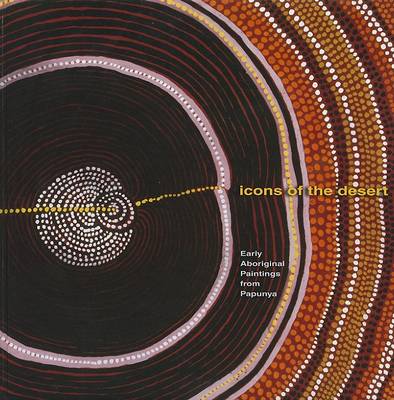Icons of the Desert is an exhibition catalog produced by the Herbert F. Johnson Museum of Art at Cornell University for a show featuring forty-nine "dot-paintings" produced by Aboriginal artists from the settlement of Panpunya. Dot-painting has become an art instantly associated with Aboriginal Australia. In the more than thirty-five years since the advent of this movement, Papunya works have been widely exhibited and acquired by private collectors and museums in Australia, and increasingly abroad.Icons of the Desert is the first book to focus on the founding expressions of Papunya art. It examines their origins in the paintings produced in Papunya in the Western Desert during the years 1971 to 1973, after the Sydney schoolteacher Geoffrey Bardon provided Aboriginal men with art materials and encouraged them to paint on Masonite, against the wishes of Australian government officials. These paintings claim a unique status. Only around six hundred were made. They are also the first painted works to transfer the designs of desert ceremonial imagery to a permanent surface. Beyond this rarity and historical significance, however, the visual qualities of Papunya boards make them a uniquely appealing body of work. They have the freshness of trial and error, of experiment by artists who were seasoned in other media adjusting to an unfamiliar format.Illustrated with full-color plates of the forty-nine exhibited works by such great artists as Clifford Possum Tjapaltjarri, Johnny Warangkula Tjupurrula, and Tim Leura Tjapaltjarri, Icons of the Desert features numerous color figures of comparative works and documentary photographs of the original artists at work, some never before published, and a chronological catalog documenting the works' history and iconography, edited by project curator Roger Benjamin. The leading Indigenous curator in the field, Hetti Perkins, contributed the preface. Roger Benjamin authored the lead essay, which situates the works in their historical and cultural context.Fred Myers, an internationally renowned cultural anthropologist who undertook his doctoral research at Papunya when the movement was still in formation, has written an essay on the stylistic development of one of the painting men he knew personally, Shorty Lungkarta Tjungurrayi. Vivien Johnson, the most prominent Australian author on Western and Central Desert art, writes on a second important artist in the collection, Charlie Tarawa Tjungurrayi. In addition, the memories of relatives of deceased painters in the exhibition are presented in the form of an interview conducted by Dick Kimber, who was a schoolteacher at Papunya in 1971 when the paintings were first produced.
- ISBN10 1934260061
- ISBN13 9781934260067
- Publish Date 13 February 2009
- Publish Status Out of Stock
- Out of Print 13 July 2011
- Publish Country US
- Imprint Cornell University Press
- Format Hardcover
- Pages 150
- Language English
